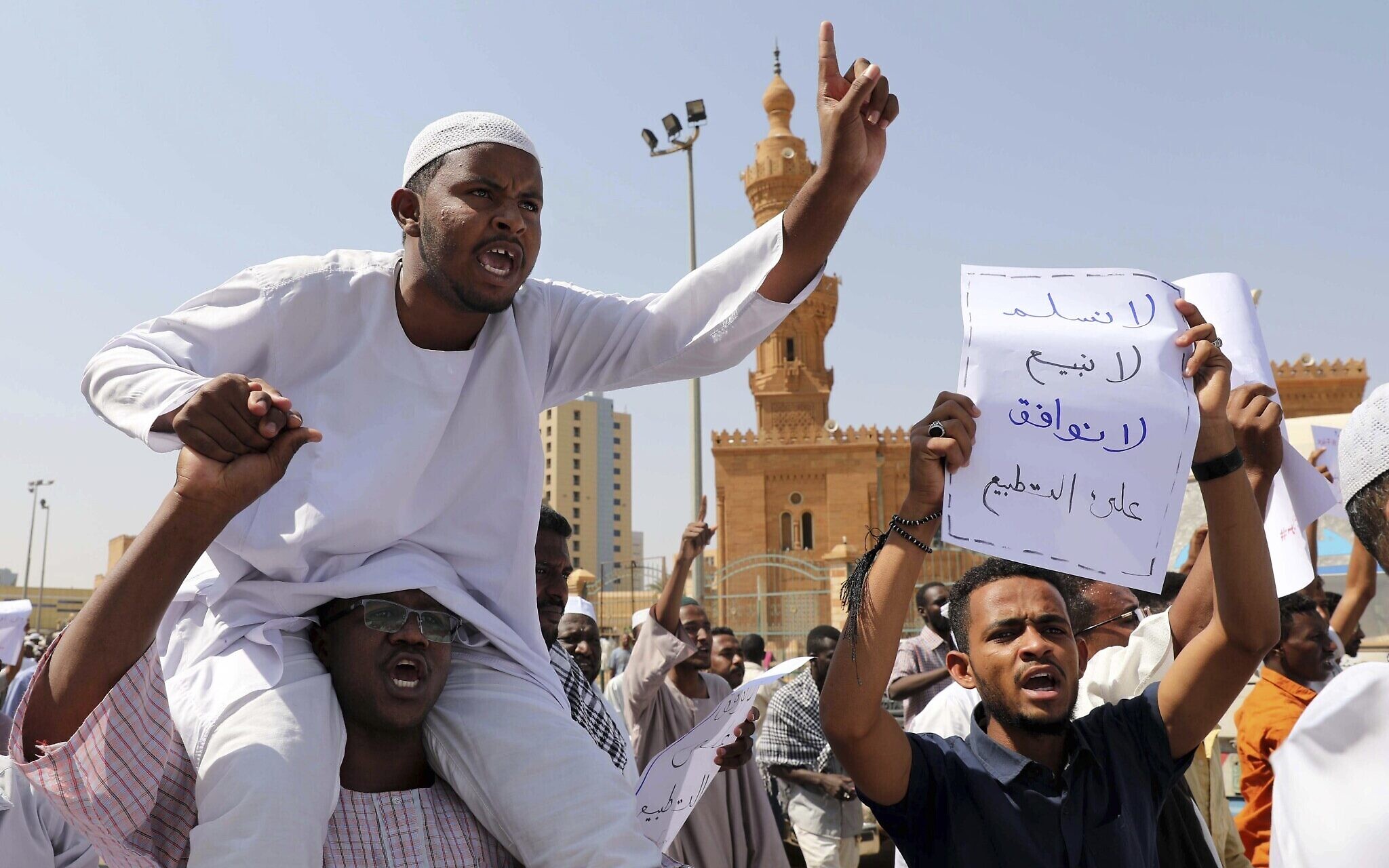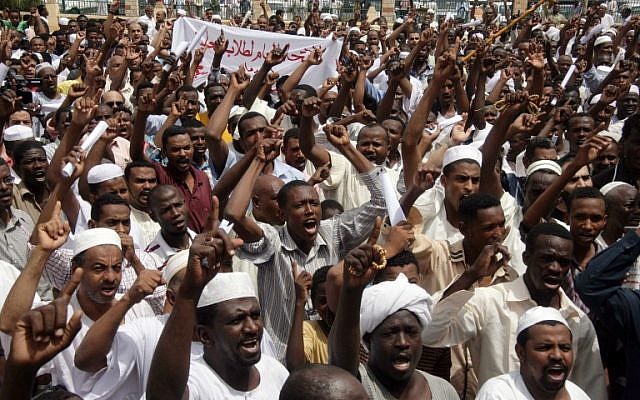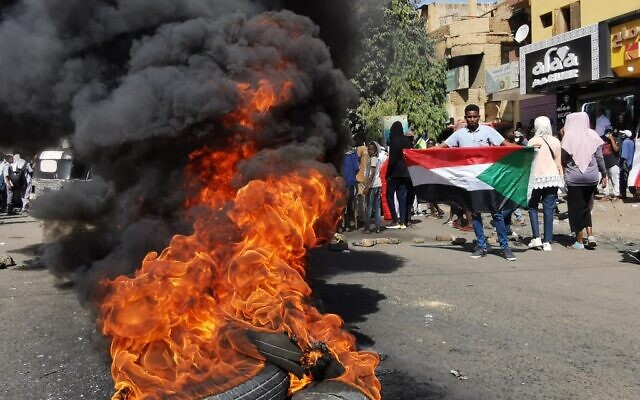Sudan’s ruling military general said Thursday he would visit Israel if invited, seeking to push ahead with stalled normalization efforts two years after the former foes agreed to establish ties.
Speaking to The Associated Press on the sidelines of the United Nations General Assembly in New York, Gen. Abdel-Fattah Burhan was asked if he, as Sudan’s leader, would visit Israel, ratcheting up a relationship that has only seen low-level or unofficial contacts so far.
“The basis of relations is reconciliation, therefore if an invitation was presented and there is the means for this, I will go,” Burhan said.
Sudan and Israel agreed to normalize relations in October 2020 as part of the US-backed Abraham Accords, a series of deals that saw the Jewish state establish ties with three other Arab nations. Months earlier, Burhan spoke with then-prime minister Benjamin Netanyahu in Uganda in an initially unannounced meeting, marking a major diplomatic breakthrough that paved the way for the normalization pact.
However, the process to launch diplomatic ties stalled after the normalization agreement was reached, amid divisions over power-sharing between Sudan’s military and civilian government that culminated in a coup last October.
Get The Times of Israel's Daily Edition by email and never miss our top stories
The coup, which upended Sudan’s short-lived transition to democracy after three decades of repressive rule by strongman Omar al-Bashir, led the Biden administration to suspend $700 million in financial assistance intended to support Sudan’s transition to a fully civilian government, including aid related to the normalization deal with Israel.
Burhan, who has been one of the main drivers of normalization with Israel, said he will not run in future elections for a civilian-led government, but offered no timeline on when a vote might happen in order for him to relinquish power.
Despite the lack of official ties, Israel and Sudan have crafted security and intelligence relationships that have seen officials exchange meetings repeatedly on unannounced trips over the past two years.

A man holds a poster with Arabic that reads, ‘We will not give up, we will not sell out, we will not agree on normalization,’ as others chant slogans to protest Sudanese President of the Sovereignty Council Abdel Fattah Abdelrahman Burhan’s contentious decision to meet Prime Minister Benjamin Netanyahu in a move toward normalizing relations, in Khartoum, Sudan, February 7, 2020. (AP Photo/Marwan Ali)
Burhan’s comments came a week after President Isaac Herzog sounded optimistic that progress could be made with Sudan, noting “positive conversations” he has held with Sudanese leaders which indicated a “mutual desire” for improved ties between the countries.
“All Israeli governments have a commitment to this dramatic transformation and to these accords, and the Israeli people salute our new friends with a joyous and open heart,” he said during an event to mark two years since Israel signed the first two normalization deals with the United Arab Emirates and Bahrain.
Following Sudan, Morocco also joined the Abraham Accords in December 2020.
Prior to the agreement, Khartoum had long been a bitter enemy of Israel and was the site of the infamous “three no’s” after the 1967 Six-Day War, in which Arab League members pledged there would be no peace, recognition or negotiations with the Jewish state.

File: Sudanese men shout slogans during a protest against Israel in the capital Khartoum on July 18, 2014. (AFP/Ebrahim Hamid)
Sudan has been mired in political turmoil for over three years since Bashir’s ouster. Its economy has teetered and inflation was expected to hit a staggering 245% this year, according to the International Monetary Fund.
Since the coup nearly a year ago, pro-democracy protesters have marched through the streets demanding the generals hand over power to civilians. They denounced Burhan’s takeover, which occurred when the military dissolved the transitional government of Sudanese prime minister Abdalla Hamdok, as well as the Sovereign Council, a power-sharing body of military officers and civilians that had been ruling Sudan since late 2019.
Hamdok had been less gung-ho about establishing ties with Israel, but had offered lukewarm support for the deal, which came alongside the US agreeing to remove Sudan from its state sponsors of terrorism list.
Underpinning the coup were tensions that had been building between supporters of military rule and those who support civilian rule — with both sides frustrated by the country’s worsening economic conditions.
Troops have opened fire at protesters, killing some of the marchers and detaining hundreds. While no police or security forces have been convicted in the deaths, Burhan said around five or six are under investigation.
“No one killed protesters in the way that’s being depicted,” he said. “Protesters clashed with police, and the police dealt with them according to the law to protect public property.”

Sudanese protesters walk past burning tires as they rally to protest against the October 2021 military coup, in the capital Khartoum, on January 9, 2022. (AFP)
Burhan said that once an elected government is in place, the armed forces would be another institution of that government rather than retain a higher status.
During the interview, Burhan stopped short of giving a date for when elections will be held, despite previously saying a vote could be held in July 2023. Instead, he said the gridlock lies with political groups that need to agree on a date for the vote. He insisted the military had no role in that discussion.
“We are talking about political participation and widening that participation, whether that is Hamdok or someone else, this person will not succeed without a wide base to rule Sudan,” Burhan said. “The only authority to rule is through elections, with no one imposing their will on another.”
He also brushed aside strains within his own transitional government, denying there were any disagreements with the deputy chief of Sudan’s ruling military council, Gen. Mohamed Hamdan Dagalo, better known by his nickname Hamedti. Local media over the past weeks reported disputes between the two generals. Dagalo has also acknowledged the failure of the October military takeover.
Amid the political upheaval, millions of Sudanese are suffering from high prices and a currency that’s dropped dramatically in value against the dollar. The ruling military leader blamed countries and institutions, which he did not name, for being behind Sudan’s deteriorating economic situation.
Sudan is in the midst of a deepening food crisis caused by “a cocktail of factors,” according to the country’s World Food Program representative, Eddie Rowe, who spoke at a UN news conference on Friday.
Sudan has seen two years of poor harvests, a summer of devastating flooding and is struggling to access vital grain imports from eastern Europe following the war in Ukraine. In response to October’s coup, many major UN donors have withdrawn funding from the country.
To help ease Sudan’s crisis, Rowe called for lasting peace, a reliable government, and further international aid and support.
Burhan decried the US decision to “freeze” its promised financial assistance.
There are those “who promised to provide assistance to Sudan, but they did not honor their promises,” Burhan said. “There was much support from those external actors but regretfully this assistance ceased for political purposes.”


